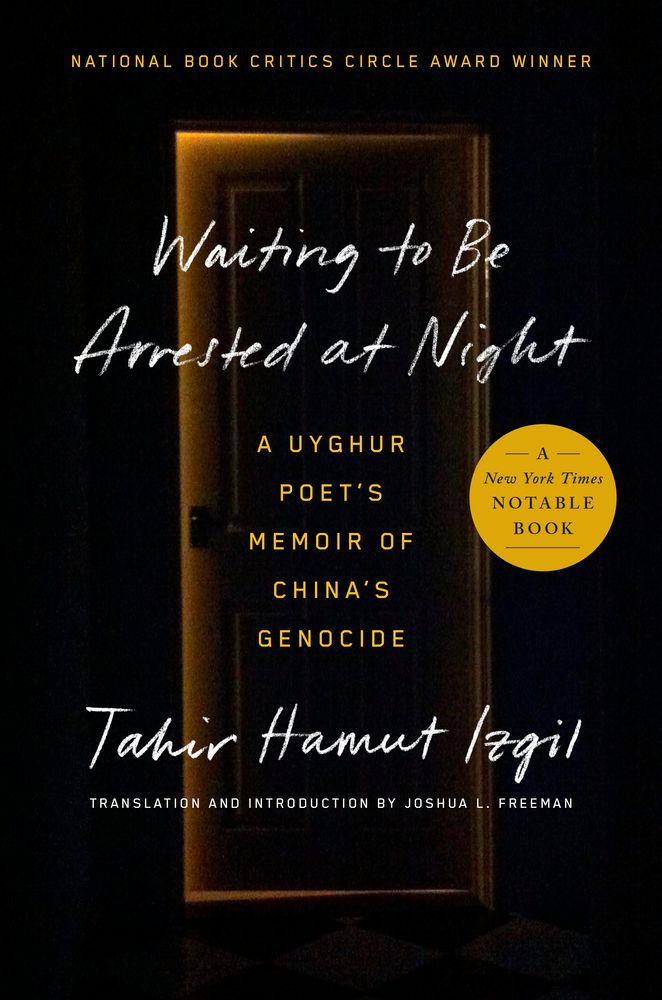I want to begin this post with a short explanation. This blog post is a companion piece to a post I wrote last year about The Backstreets, the first Uyghur-authored* novel to be translated into English. That post briefly touches on the ongoing situation with the Chinese government’s repression of the predominantly Muslim Uyghur people in Xinjiang Province. Waiting to be Arrested at Night: A Uyghur Poet’s Memoir of China’s Genocide is a firsthand account of a family’s escape from the province after the situation escalated 2017, and includes an introduction from the book’s translator that recounts some recent events from Xinjiang. It’s worth taking the time to read, because the overview the translator provides helpfully contextualizes the author’s experiences.
In the translator’s introduction, Tahir Hamut Izgil is described as “one of the greatest living Uyghur poets.” But before making his name as an artist, Izgil spent three years in a “reeducation through labor” camp after being arrested for attempting to travel abroad for school and confessed under torture to wishing to share “state secrets” with outside elements. After his release, he returned home and founded an independent film studio based in Ürümqi, the capital of Xinjiang province. He earned a good deal of recognition as a film producer and director, as well as being a well-respected poet in a culture that truly values poetry. But that recognition would later make him, like many other Uyghur artists and intellectuals, a target for a Chinese government looking to gain tighter control over the province.
Izgil begins his memoir with a story from 2009 when a surprise visit from a local policeman to his home led to an hours-long interrogation, ending in him giving the police the username and password to his personal email. As time went on, his run-ins with the authorities become more fraught. The party propaganda office once gave him a vague order to remove certain words from a script for a film he was actively filming, with no suggestions of what to say instead. He would deal with the police again when eight of them showed up unannounced at a gathering Izgil and several other poets** organized to share their new poems. His attempts to get a passport were continually thwarted by a bureaucracy designed to make the process difficult for minorities in China. He describes regularly seeing Uyghurs getting arrested en masse to go “study,” a euphemism for being sent to an internment camp to reform their beliefs when the government crackdowns truly escalated in 2017. And while all of this was going on, Izgil continually tried to find ways to avoid arrest, to not give in to the paranoia and despair of his situation, and, eventually, find a way to escape.
I do not mean to portray this book as simply an account of the terrors Izgil went through. Many chapters in Waiting to be Arrested at Night are simply about how Izgil and his family try to live their lives doing “normal” things, like selling their apartment or visiting friends and family around town. But even quiet chapters like these contain the sense that the dangers they face are never far away, that his and his family’s very existence is considered problematic by the state. There’s something poetic about how Izgil describes this period of his life, and it’s what makes his memoir such an urgent and striking read.
Tahir Hamut Izgil and his family were able to flee Xinjiang in 2017 and were granted asylum in the United States. He currently lives with his family in the Washington, DC area.
You can place a copy of Waiting to be Arrested at Night on hold through the Heights Library website or order the ebook or audiobook through Libby/Overdrive.
*Pronunciation guide: Uyghur is pronounced as “Wee-gur.” Xinjiang is pronounced as “Shin-jahng.” Ürümqi is pronounced as “oo-Room-chi.” Capital letters indicate where to put emphasis.
**One of the poets at this gathering was Perhat Tursun, author of The Backstreets and good friend to Izgil, who authored the novel I wrote about in my other post.

